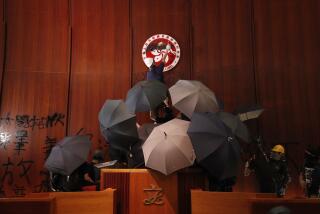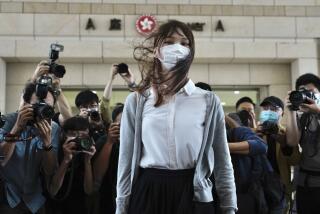Hong Kong student leader calls hunger strike ‘a humble demand’
Reporting from Hong Kong — Joshua Wong, the 18-year-old who has become one of the leaders of Hong Kong’s pro-democracy movement, said Monday that he and two other teenage students would begin a hunger strike in a bid to reopen dialogue with the government.
“This is a humble demand, not some fanciful thinking,” Wong said at a rally Monday night. “All along, I want to gain more public support. So now I want to use my body to move more adults to our cause.”
Wong’s announcement that he and two young women would, beginning Tuesday, subsist on water while staying in tents outside Hong Kong’s government complex came as protesters were chased from the area overnight. Wong had said earlier that he could no longer be on the front lines of the protests because another arrest would bring imprisonment.
Wong, leader of the high-school activist group Scholarism, was released on bail Thursday after being arrested during a confrontation with court bailiffs at a protest encampment in the Mong Kok neighborhood.
Protester Andy Lam, 45, shook his head as Wong announced the hunger strike.
“I’d rather see him continue to maximize his strength and influence wisely to propel this movement forward,” Lam said. “Now this will only hurt him, and the government will sure be insensitive to his suffering.”
In the early days of the movement, Benny Mok, a protester and diabetic, went on a hunger strike for 46 days before quitting on medical advice.
As of Monday, Wong was ranked third in Time magazine’s reader poll to help select the “person of the year,” trailing the Ferguson protesters and Indian Prime Minister Narendra Modi.
Wong’s announcement came after about 2,000 protesters who had attempted to surround the government’s headquarters Sunday night were beaten back by police, causing some to question the movement’s reliance on nonviolent tactics.
“Some said we need to fight back. I too have reconsidered if nonviolence is enough to force our government into concession,” said Lester Shum, deputy secretary of the college student group Hong Kong Federation of Students.
“But are we psychologically ready for bullets and tanks?” he asked. “Are we equipped for an armed insurrection? We’re facing a regime with such limitless power that we can’t match.”
Underscoring the government’s ability to frustrate the protesters’ efforts, the territory’s High Court on Monday granted an injunction seeking to clear the roadways on the fringes of the demonstrators’ encampment in the Admiralty neighborhood. On Friday, Beijing said it would bar a delegation of British lawmakers from visiting Hong Kong to investigate whether the terms of the Sino-British Joint Declaration, under which the territory reverted to Chinese rule 17 years ago, had been violated.
In Washington on Monday, States Department spokeswoman Jen Psaki said, “We encourage differences between Hong Kong authorities and protesters to be addressed peacefully through dialogue.”
The movement in Hong Kong, begun in late September, has become the longest pro-democracy campaign on Chinese soil. The demonstrations erupted when officials in Beijing published guidelines for the scheduled 2017 election for chief executive that critics said would not allow for the free nomination of candidates. The territory had been promised a degree of autonomy under the Sino-British Joint Declaration.
After drawing massive crowds to the streets in September and October, the protests have diminished substantially, although a few thousand demonstrators remain encamped in the Admiralty and Causeway Bay neighborhoods. Holdouts in Mong Kok were forcibly removed last week.
Despite setbacks and pouring rain, protesters packed the rally in the Admiralty encampments Monday night. They stood in glum anticipation under the garish glare of a lighted Christmas display of Santa, and pigeons adorning a skyscraper right above.
Law is a special correspondent.
More to Read
Sign up for Essential California
The most important California stories and recommendations in your inbox every morning.
You may occasionally receive promotional content from the Los Angeles Times.










